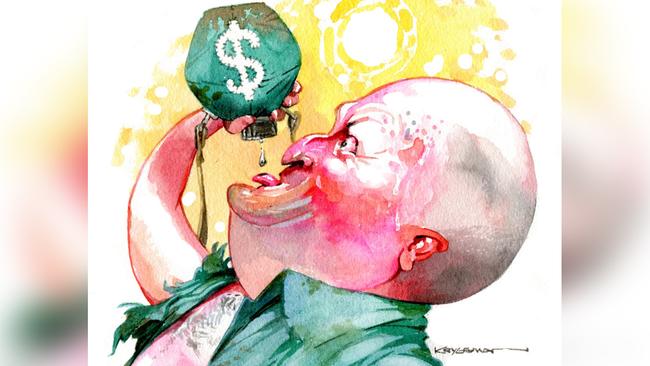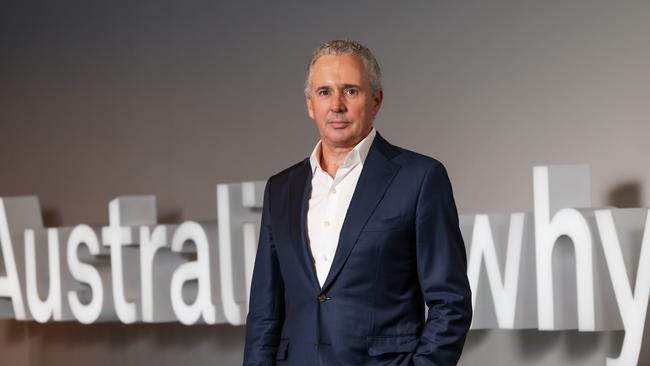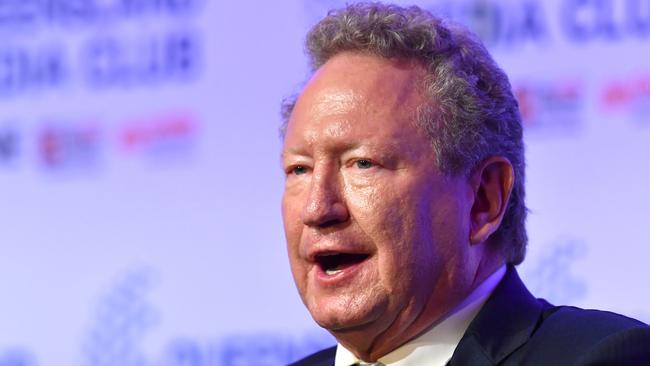Australia’s big telcos are at a turning point as earnings slide

Optus’s regulatory boss Andrew Sheridan says the industry is at a turning point and the simple fact is that “businesses that are not profitable can’t invest”.
UBS figures show returns on investment excluding NBN payments have fallen from 8.3 per cent in 2016 to 2.8 per cent last year, which is clearly below the cost of capital.
The crisis hasn’t rated a mention in the federal election but one possible solution clearly would be for the industry to raise consumer prices.
Earnings for the big three combined – Telstra, Optus and TPG – excluding NBN handouts have fallen from $6.9bn in 2016 to $2.5bn last year, which is less than the $3.1bn reported for just the last six months by the smallest member of the bank cartel, ANZ.
The NBN is one issue, with its fixed line monopoly ruining profit margins across the board, but this fight is well choreographed through the ACCC – in stark contrast to the battle against the over the top operators (OTTs) like Amazon, Apple, Netflix and a host of others.
All the hype over 5G has yet to materialise in the telco accounts. The reality so far is the telcos have provided the platforms but others have realised the value, leaving the telcos once again as just “dumb pipes”.

Outgoing Telstra boss Andy Penn underlined the issue, telling the Wall Street Journal recently that “too often in the past we have left too much value on the table”.
In a speech this week, Optus’s Sheridan noted that “OTTs don’t have to think about how much bandwidth is used because it is a free good in their eyes. They avoid the costs of investing in the access and capacity they consume. They also avoid the heavy burden of regulation that is associated with owning infrastructure.”
In a show of rare unanimity in the sector, TPG’s Inaki Berroeta argued in support at the Communications Day conference this week, saying: “The connectivity we provide has enabled the nation’s shift to new ways of hybrid working, it’s led to an acceleration in the digitisation of the economy, and it’s provided the critical infrastructure other industries such as streaming, gaming and entertainment have relied, thrived and enjoyed a free ride upon.”
The ACCC this week formally launched an investigation into Telstra’s $50m acquisition of 50 per cent of Fetch TV. In essence, the deal replaces its expiring contract with Telstra TV’s hardware and software provider Roku and provides more upside for Telstra to monetise OTT use of its platform.
Because Telstra also owns 35 per cent of Foxtel, and because it’s Telstra, the ACCC was bound to have a look. But it should clear the deal. This will at least provide some way for Telstra to monetise the fact people will still watch Netflix on its platform.
Penn has argued that “technology is evolving quickly and regulation is struggling to keep pace. As a consequence, some of the policy settings in place today are no longer fit for purpose.”
In the industry’s sights are services like Viber – a free app that allows users to make free calls, send texts, pictures and video messages to other Viber users – or Facebook’s call and chat platform WhatsApp.
The industry argues the case for a more even playing field demands government intervention, and some way of compensating the telcos – like last year’s media bargaining code with the digital platforms.
That fight saw the ACCC and government intervene against Google and Meta (Facebook).
It’s a global debate.
The industry has a point, but amid the election noise it’s way down the list of fights either side wants just now.
PLASTIC POLLUTION
Andrew Forrest figures that since 1930 the world has created 6.3 billion tonnes of plastic, of which just 9 per cent has been recycled. He says technology exists to reduce the leakage by 80 per cent.
This week his Minderoo Foundation will roll out more initiatives in the campaign to stop plastic waste choking the world’s oceans,
Its efforts to advance the cause start with transparency, including its Plastic Waste Makers Index, which shows 20 companies account for more than 50 per cent of single waste production. The top three – Exxon Mobil, Sinopec and Dow – account for 17.1 per cent.
Ruffy Geminder’s Pact is a big proponent of the three Rs – reduce, reuse, recycle – including a $45m joint venture in Woodonga with Cleanaway, Asahi and Coca-Cola to collect and recycle a billion bottles each year.

The $750m environment investor and project developer Green Collar has three projects under way in North Queensland, Vanuatu and Ghana working with Washington-based standards producer Verra to establish plastics credits.
North Queensland banana farmers create more than 500 tonnes of waste a year through single-use plastic bags used to protect ripening fruit.
Plastic credits is a new way to cut the waste even if the bags end up as waste fill – that arguably beats the Great Barrier Reef.
Like carbon credits you get one credit for each tonne of plastic either removed from the environment or recycled, on the basis that without the intervention there would be no additional gain.
All three are valuable projects to help unclog the world’s oceans.
Forrest has explored the idea of charging plastic makers a levy to fund a recovery effort.
Some argue to solve such problems you shouldn’t start with the market – you should end there – which means you work through the full circle.
Rich Gilmore from Carbon Growth Partners argues the market should be part of the solution, but other measures are needed.
The game is natural capital measurement and monetisation but the best solution is to cut down on single-use plastic.
ASIC GUIDELINES
Nicholas Moore’s Financial Regulator Assessment Authority will next month release guideposts on just what it expects from ASIC, rather than a formal assessment of just how Joe Longo’s team is operating.
FRAA was established on the recommendation of financial services royal commissioner Ken Hayne in early 2019 and created last September, with former banker and Medibank boss Craig Drummond as a member and Allens lawyer Fiona Crosbie, who replaced the now ACCC boss Gina Cass-Gottlieb.
When the ASIC guideposts are released it will show what FRAA is expecting from the corporate cop, as opposed to an independent assessment. Then a more formal review of APRA begins and the annual process winds on.
Former NAB chair Ken Henry was critical of FRAA this week, arguing it was bureaucratic overload, and it remains to be seen what value is added against the theory of keeping the regulators on the job.



The big telcos are angry and getting more vocal, because while everyone else is talking up the digital economy their returns on investment have more than halved since 2015, as have earnings.